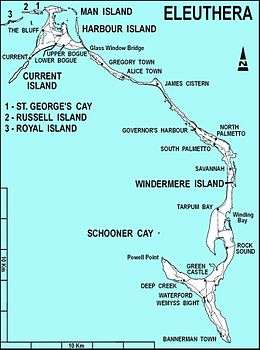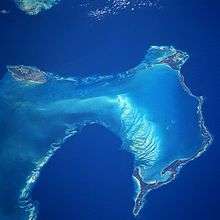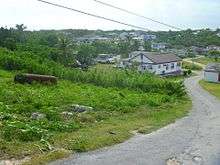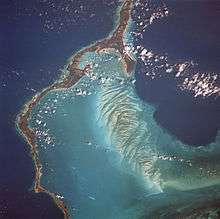Eleuthera
Eleuthera (/ɪˈljuːθərə/) refers both to a single island in the archipelagic state of The Commonwealth of the Bahamas and to its associated group of smaller islands.[1] Eleuthera forms a part of the Great Bahama Bank.[1] The island of Eleuthera incorporates the smaller Harbour Island. "Eleuthera" derives from the feminine form of the Greek adjective ἐλεύθερος (eleútheros), meaning "free".[2] Known in the 17th century as Cigateo, it lies 80 km (50 miles) east of Nassau. It is long and thin—180 km (110 miles) long and in places little more than 1.6 km (1.0 mile) wide. Its eastern side faces the Atlantic Ocean, and its western side faces the Great Bahama Bank. The topography of the island varies from wide rolling pink sand beaches to large outcrops of ancient coral reefs, and its population is approximately 11,000. The principal economy of the island is tourism.
 Map showing the main island of Eleuthera and its associated smaller islands (Russel, Royal, Harbour, and Windermere Islands and associated Cays), other geographical features, and concentrations of population | |
| Geography | |
|---|---|
| Coordinates | |
| Archipelago | Bahamas |
| Adjacent bodies of water | North Atlantic Ocean |
| Major islands | Eleuthera and Harbour Island |
| Area | 457.4 km2 (176.6 sq mi) |
| Length | 180 km (112 mi) |
| Width | 1.6 km (0.99 mi) |
| Highest elevation | 61 m (200 ft) |
| Administration | |
| Districts | North Eleuthera, Central Eleuthera, South Eleuthera |
| Demographics | |
| Population | 11,000 (2017) |
| Ethnic groups | 85% black (esp. West African), 12% European, 3% other |
| Additional information | |
| Time zone | |
| • Summer (DST) | |
| ISO code | BS-CE BS-NE BS-SE |
Geography and wildlife
The name Eleuthera refers both to the single Bahamian island and is also used to refer to its associated chain of small islands, which include Harbour Island, Windermere Island, Man Island and Current Island.[3] Eleuthera forms part of the Great Bahama Bank on its western edge and its eastern coastline faces the Atlantic Ocean.[1][4] The main island lies 80 km (50 miles) east of Nassau.[1] It is a long and thin island; 180 km (110 miles) long and little more than 1.6 km (1.0 mile) wide at its narrowest.[2] The island has an estimated area of 457.4 square-kilometers,[5] and presents 336 km (210 miles) of coastline.
The topography of the island varies, including wide rolling pink sand beaches, large outcrops of ancient coral reefs, caves and other geological features.[1] The island features, among other flora and fauna, 13 catalogued species of native amphibian and reptile species, three of which were listed as endangered in 2000.[5] The main island is home to a 25-acre nature preserve; the Leon Levy Native Plant Reserve, which includes an environmental education centre.[6] The waters around Eleuthera contain an abundance of sharks and rays, which is attributed by the local Cape Eleuthera Institute to the banning of long-line fishing in local waters.[7]
History
The possible first settlers of the island were the original population of Taino, or Arawaks.[8] An intact wooden duho or ritual seat that was made by the Taino people was found on the island of Eleuthera in the nineteenth century and is now in the collections of the British Museum.[9] The island in its early history was known as Cigateo, but this name changed following subsequent European settlement.[8]

The island is believed to have been largely unoccupied at the time of the arrival of the first significant number of British settlers, with Puritan colonists (who had come together the previous year in London) arriving in 1648 from Bermuda.[8] These settlers, known as the "Eleutherian Adventurers", under Captain William Sayle gave the island its current name which derives from the feminine form of the Greek adjective ἐλεύθερος, eleutheros, meaning "free".[10][11] The difficulties of settlement ultimately left only a few of the settlers on the island, thwarting their aim of creating the first European "democracy" in the Western Hemisphere (almost 130 years prior to the American Revolution).[12]
The island was stated to have been agriculturally prosperous in the period from 1950 to 1980.[1] This included a large crop of pineapples for export. When the Bahamas became independent from Britain in 1973, new ownership laws changed the nature of the island economy. Since then the island has become a popular tourist destination.[1]
In 1992 the island was severely damaged by the category 5 Hurricane Andrew; massive wind speeds hit the island and an 18-foot tidal surge inundated the coastal area.[13] Relief efforts helped mitigate some of the damage, including a number of relief tasks that were carried out by HMS Cardiff as the vessel was operating in the area.[14]
In early March 2019, Disney Cruise Line purchased the Lighthouse Point property on the island of Eleuthera and agreed to a development plan for the area with the Bahamian government. Disney is expected to spend between $250 million and $400 million on developing the 700 acre property, and donate 190 acres - including the southernmost tip - to the government for a national park.[15]
Demography

In 2000, the official census taken by the Government of the Bahamas recorded a population of 7,999 persons on the island.[16] In 2010, the official census recorded the population as 8,202 spread across 2,718 separate households.[16] The 2010 census stated that population density of the island was 57.6 persons, per square mile.[16] As of 2017 it was stated that the population of the islands were approximately 11,000.[17]
Economy and settlements

Settlements on the island include (north to south) the Bluff, Upper and Lower Bogue, Current, Gregory Town, Alice Town, James Cistern, Governor's Harbour, North and South Palmetto Point, Savannah Sound, Winding Bay, Tarpum Bay, Rock Sound, Greencastle, Deep Creek, Delancy Town, Waterford, Wemyss Bight, John Millars, Millar's and Bannerman Town.[18]
The largest of the settlements are Governor's Harbour (the administrative capital), Rock Sound, Tarpum Bay, Harbour Island with its unusual pink sandy beaches and Spanish Wells.[19] The largest settlements in terms of population in Eleuthera are Dunmore Town, Spanish Wells and Rock Sound.[19]
There is an annual Pineapple Festival in Gregory Town. Eleuthera is a destination for those interested in Bahamian history and nature, and neighboring Harbour Island and Spanish Wells offer further tourism experiences. Natural attractions include the Glass Window Bridge, Hatchet Bay caves and Surfer's Beach in the north, and Ocean Hole and Lighthouse Beach at the south end. Preacher's Cave on the north end was home to the Eleutherian Adventurers in the mid-17th century, and recent excavations have uncovered Arawak remains at the site. As of 2000, per capita GDP for the island was: $5756 Bahamian, with a chief human economic activity being tourism, and 6% of population being involved in fishing, agriculture, or mining.[5]
Education
The Island School is a private secondary school in Eleuthera.[20] The Deep Creek Middle School is an independent school on Eleuthera for grades seven to nine.[21] There are 12 primary schools (grades 1 to 6) on Eleuthera; Deep Creek Primary, Emma E. Cooper Primary, Governor's Harbour Primary, Green Castle Primary, Gregory Town Primary, James Cistern Primary, Current Island Primary, North Eleuthera Primary, P.A. Gibson Primary, Rock Sound Primary, Tarpum Bay Primary and Wemyss Bight Primary schools.[22]
The Cape Eleuthera Institute is a research and summer education institute on the main island.[23] The Haynes Public library is located in Governors Harbour in a historical building constructed in 1897; it is the oldest Government Complex on the island.[24]
Transport
.jpg)
The island is reached by sea and by air links from the rest of The Bahamas. Three airports serve the island. North Eleuthera Airport, with a 1,835-metre (6,020 ft) runway on the north part of the island and located inland.[25] Governor's Harbour Airport is located in the middle of the main island and has services to Nassau.[26] Rock Sound Airport is an airport in the South Eleuthera district of the Bahamas.[27] Its name comes from the former district of Rock Sound.
The main island has one principal road, the Queens Highway, which runs the length of the island.[28] The road runs for a total length of 177 kilometres (110 mi).[29] In 2009, 13 million USD was given by the Bahamas government for roadworks of 97 kilometres (60 mi).[28]
Ports and marinas open for traffic on Eleuthera include Governor's Harbour, Current Island, Harbour Island & North Eleuthera, Rock Sound and Spanish Wells.[30] In 2011 a number of improvements were carried out to the docks at Current Island to improve access for vehicular traffic, including replacement of the wooden jetty.[31]
U.S. military bases
NAVFAC Eleuthera
The United States Naval Facility (NAVFAC) Eleuthera, Bahamas was a shore terminus and processing facility for the Sound Surveillance System operated by the U.S. Navy to detect submarines. In 1951 a six element test array had been placed off shore to demonstrate the system's capability to detect submarines. After successful tests with a U.S. submarine a functional forty element array was installed in 1952 as one of a total of nine Atlantic systems ordered.[32] Though it was the first array to be installed, it was last to get the operational shore terminal under Navy command when NAVFAC Eleuthera was commissioned on 1 September 1957. The facility had a complement of 150 officers and enlisted men, a resident Western Electric engineer, some nineteen Pan-American Airway and RCA contractors and 45 Bahamian employees supported the facility. NAVFAC Eleuthera was decommissioned 31 March 1980 after 23 years of service.[33][34] It was located near Governor's Harbour Airport.[33] The first U.S. Navy women to be assigned to a SOSUS facility were the eleven assigned to NAVFAC Eleuthera in 1972. Seventeen years earlier the Canadian contingent of the joint U.S./Canadian Forces SOSUS facility, Canadian Forces Station (CFS) Shelburne, included five women of the Women's Royal Canadian Naval Service.[32][35]
Adjacent to the NAVFAC was the original site of the first experimental array and electronics, operated by two Western Electric engineers and a few military personnel, which continued in service as an avenue for experiments.[33]
Eleuthera AAFB
The US Air Force Eastern Test Range (ETR) Range Tracking Station No. 4 was sited at Eleuthera AAFB (ELU AUXILIARY AIR FORCE BASE), supported by contractor employees of the Radio Corporation of America (RCA) and Pan American Airways (PAA) in the 1960s and 1970s. This was used by the MISTRAM system.[33]
In popular culture
The island inspired a song named "Eleutheria" (freedom) by Lenny Kravitz in 1993.[2] Kravitz is a resident of the island and has stated many of his songs were written while on the island.[2]
References
- "Eleuthera". Bahamas National Trust. Retrieved 21 February 2017.
- "Lenny Kravitz interview". The Times. Retrieved 21 February 2017.
- "Eleuthera & Harbour Island". bahamas.com. Retrieved 6 January 2017.
- Porter, D (2007). Bahamas for Dummies. John Wiley. p. 46-47.
- Dahl, Arthur & UNEP Staff (October 21, 1990). "UNEP Island Directory: Islands of Bahamas, Eleuthera [99]". Geneva, CHE: United Nations Environment Program (UNEP). Retrieved January 6, 2017.
- "Leon Levy Native Plant Preserve". Bahamas National Trust. Retrieved 21 February 2017.
- "What Sharks Mean to the Bahamian Economy". The Caribbean Journal. Retrieved 21 February 2017.
- "History of Eleuthera". Glorious Bahamas. Retrieved 21 February 2017.
- BM Staff (January 6, 2017). "British Museum Online Collection: Stool". BritishMuseum.org. Retrieved January 6, 2017.
- Bethell, A. Talbot. The Early Settlers of the Bahamas and Colonists of North America. Baltimore, MD: Clearfield Co. p. 82. ISBN 0806350504. Retrieved January 6, 2017.
Page number and ISBN are for the revised reprint edition from the Genealogical Publishing Company, 2009.
- "Caribbean: The Bahamas". British Empire. Retrieved 22 February 2017.
- Riley, Sandra (foreword by Thelma B. Peters) (2000). Homeward Bound: A History of the Bahama Islands to 1850 with a Definitive Study of Abaco in the American Loyalist Plantation Period. Miami, FL: Island Research. p. 28. ISBN 0966531027. Retrieved January 6, 2017.CS1 maint: uses authors parameter (link)
- Jonathan Freedland (1992-09-02). "Storm Ravaged Island in Bahamas". Washington Post. Nassau, Bahamas. Retrieved 2012-06-20.
- Bahamas and U.S.A. – Hurricane Andrew Aug 1992 UN DHA Information Reports 1-3. United Nations Department of Humanitarian Affairs (Report). New York City, New York: ReliefWeb. 1992-08-26. Retrieved 2012-06-20.
- Tribou, Richard (March 11, 2019). "Disney Cruise Line completes land purchase, enters agreement for second Bahamas destination". Orlando Sentinel. Retrieved March 12, 2019.
- "ELEUTHERA: Census of Population and Housing" (PDF). The Commonwealth of The Bahamas. Retrieved 21 February 2017.
- "Eleuthera". The Official Site of The Bahamas. Retrieved 21 February 2017.
- "Eleuthera". The Bahamas Government Website. Retrieved 22 February 2017.
- "Eleuthera Districts". City Population. Retrieved 21 February 2017.
- "About". The Island School. Retrieved 21 February 2017.
- "Home". Deep Creek Middle School. Retrieved 21 February 2017.
- "Eleuthera Primary Schools". Ministry of Education, Bahamas. Retrieved 21 February 2017.
- "About". The Cape Eleuthera Institute. Retrieved 21 February 2017.
- "Haynes Library". The Official Site of the Bahamas. Retrieved 22 February 2017.
- "North Eleuthera". World Aero Data. Retrieved 21 February 2017.
- "Governor's Harbour". World Aero Data. Retrieved 21 February 2017.
- "Rock Sound". World Aero Data. Retrieved 21 February 2017.
- "Eleuthera Road". The Bahamas Weekly. Retrieved 21 February 2017.
- "Eleuthera Guide". Frommers. Retrieved 22 February 2017.
- "Bahamas Ports of Entry". Out Islands. Retrieved 21 February 2017.
- The Government of the Bahamas, Press Release. The Government enhances Public Infrastructure in Eleuthera. August 2011
- "Integrated Undersea Surveillance System (IUSS) History 1950 - 2010". IUSS/CAESAR Alumni Association. Retrieved 11 February 2020.
- "Ruins and Ghost Towns". Project Eleuthera. Retrieved 21 February 2017.
- Commander Undersea Surveillance. "Naval Facility Eleuthera September 1957 - March 1980". U.S. Navy. Retrieved 16 February 2020.
- "Four of the "Original Five" WRENs at Shelburne 1955". IUSS/Caesar Alumni Association. Retrieved 26 March 2020.
Further reading
- "Eleuthera Island: History Notes". eleuthera-map.com. Retrieved 6 January 2017.
- "Articles and Orders, Bahamas 1647". jabezcorner.com. Retrieved 6 January 2017.
- "Cast Your Bread". Harvard Magazine. May 2010. Retrieved 24 May 2016.
- Riley, Sandra (foreword by Thelma B. Peters) (2000). Homeward Bound: A History of the Bahama Islands to 1850 with a Definitive Study of Abaco in the American Loyalist Plantation Period. Miami, FL: Island Research. ISBN 0966531027. Retrieved January 6, 2017.CS1 maint: uses authors parameter (link)
- BHC Staff (January 6, 2017). "The Commonwealth of Bahamas History" (PDF). London: The Bahamas High Commission (BHC). Archived from the original (PDF) on March 15, 2016. Retrieved January 6, 2017.
External links
